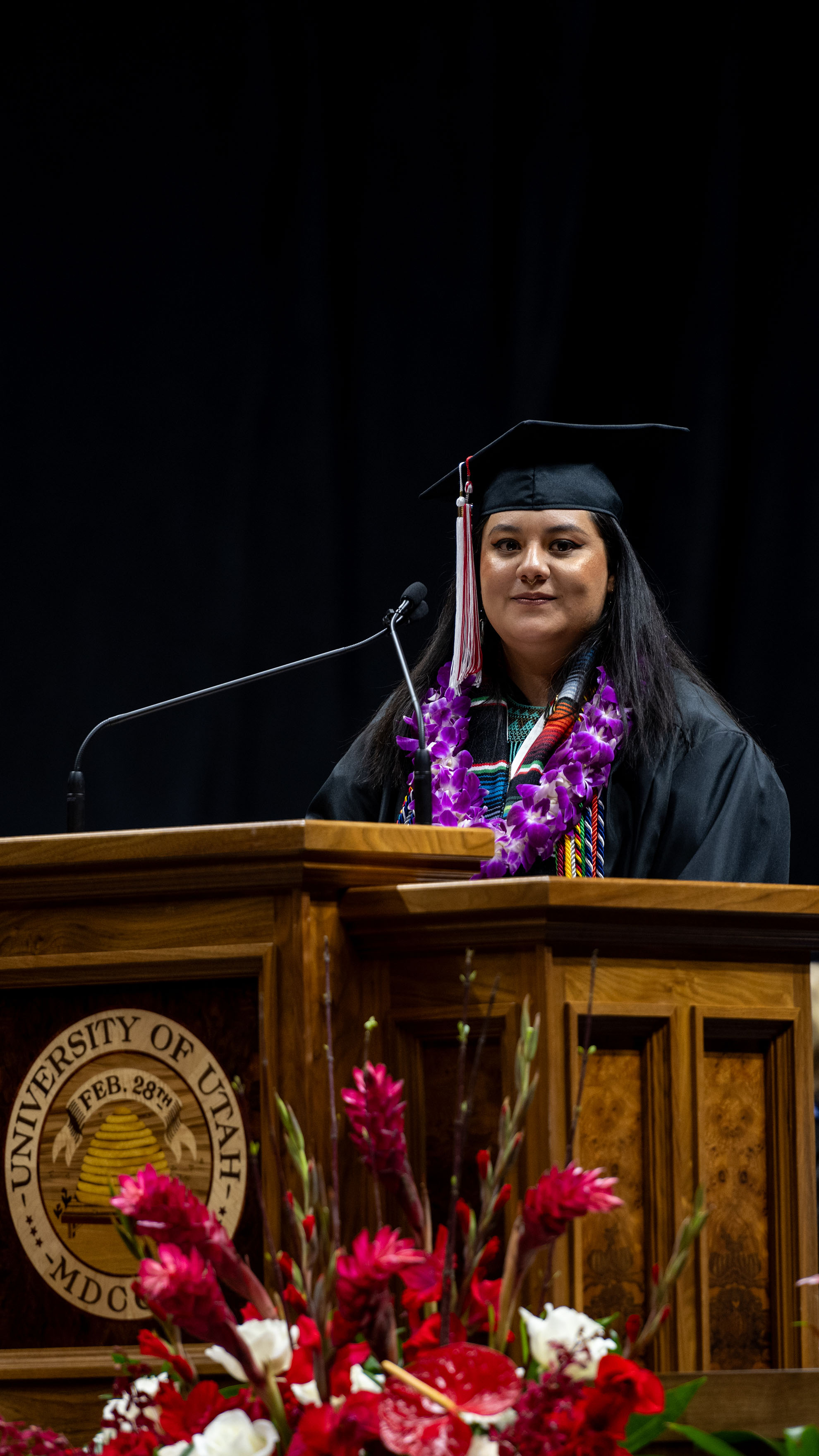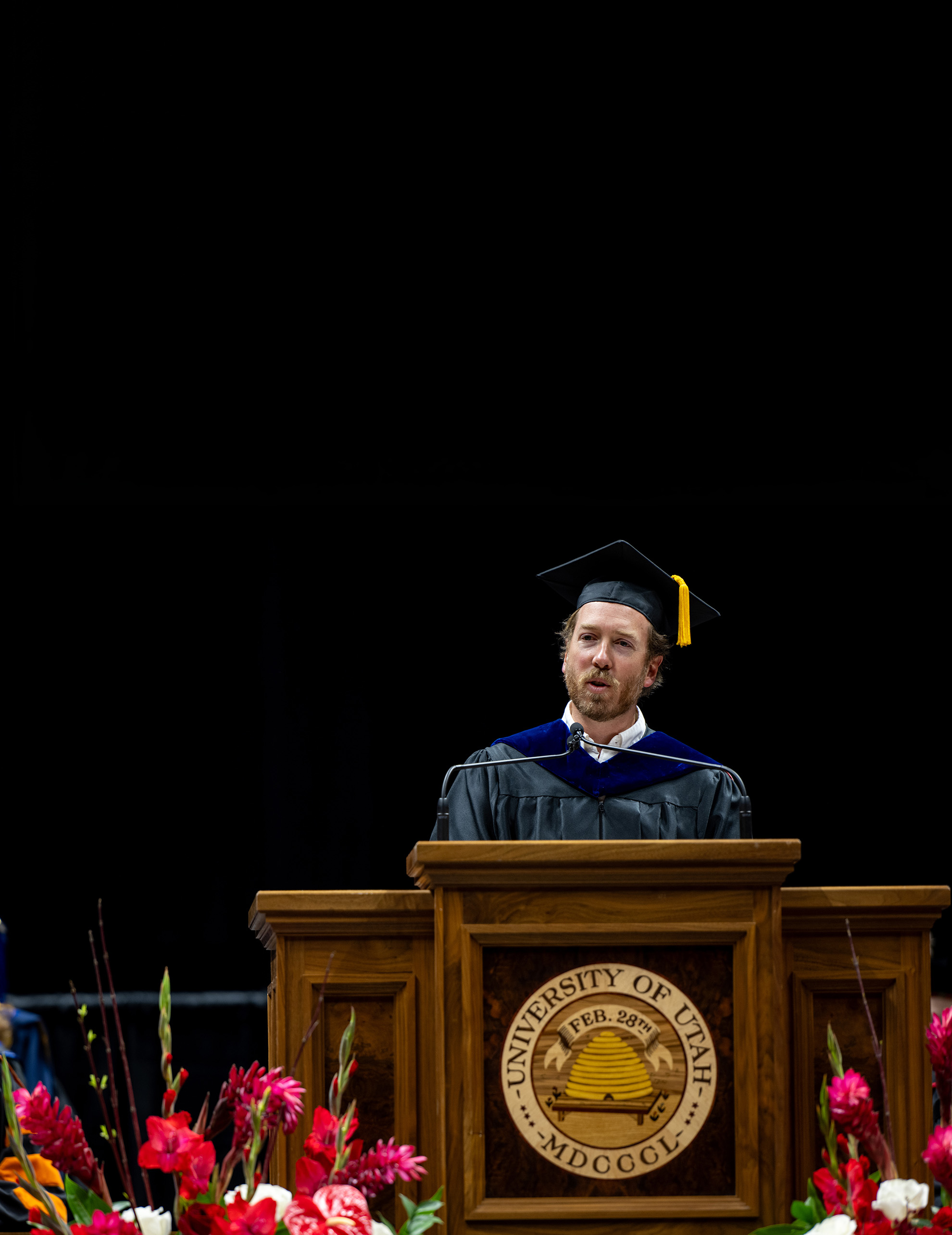College of Humanities Class of
2024
Student Speaker
Evelyn Cervantes
![]()
Speech given by the May 2024 College of Humanities' Student Speaker.
Me imagino que no soy la única cuando digo que este sueño ha sido tan increíblemente difícil. When I made the decision to return to school I did not know it would be one of the most difficult periods of my life. This journey unfolded against the COVID-19 pandemic, weaving an intricate web of change for which none of us were prepared. I bore witness to the heart-wrenching loss of loved ones, navigating the complex layers of grief as life unfolded.
My international studies classes took on a profound significance as I observed their direct impact on my family. Immigration policies like the Temporary Protections Program became not just theoretical concepts but tangible forces altering our lives. In Nicaragua, the political situation kept making life more and more difficult for my family. When a door opened for Nicaraguan loved ones to join us in the United States, I made the reckless and life-altering decision to sponsor 12 family members to come live with us.
A veces, el universo nos pide que hagamos el bien imprudentemente.
Sometimes, the world asks us to do good recklessly.
In the 1960s, during the height of the civil rights movement, reformists like Dolores Huerta gathered to fight for justice. When Huerta, a then mother of 11, left her children with the communities where she organized, the world saw the sacrifices that change would require. While some believed her choices were reckless, she knew she was going to change the world for all of us. Her sacrifices led to agriculture reform that improved the lives of thousands, perhaps even millions of farm workers today.
As my family’s sponsorship applications were approved, our family grew from three to four, and ultimately 12 within a matter of months. Our sobrinas and sobrinos, hermanas y hermanos all became part of our daily lives again, we became the members of the family we had always wanted, un sueño que muchos de nuestros padres no vivieron. But the joy of growth was tempered by the complexities of navigating classes, full-time employment, ever-changing immigration systems, and welcoming our loved ones into this land.
There were days that dropped me to my knees, and in tears, I wondered many times if that semester would be my last. Hubo tantos días que sentía que no lo iba a lograr.
I found myself torn between attending classes and volunteering at a food bank where I knew I would receive free food for my growing family. My class participation floundered; at times, it felt like my world was falling apart. I knew that I was changing lives and yet my grades didn’t reflect that. When my professors began to worry I had to trust that they’d understand.

Distinguished Alumni
Kevin Knight
![]()
Speech given by the May 2024 recipient of the College of Humanities' Distinguished Alumni Award.

Good afternoon, Utes! I have to say, it’s one thing to give a speech. It’s another to give a speech to a university college. And it’s another thing entirely to give a speech to a room filled with graduates and academics from a college that includes the departments of communication, English, history, linguistics, philosophy, world cultures, and writing.
Never before have I given a speech that could so easily be evaluated and critiqued by experts in every facet of that speech. I hope you’ll forgive the occasional “um,” grammatical mistep, misused word, or oversimplified fact.
About 12 years ago, I was a relatively young Facebook employee meeting with OMD, one of the biggest ad agencies in the world, at their office in Lower Manhattan. We gathered in a conference room and as we settled into our chairs, someone casually mentioned that we were sitting in the room from which the very first transatlantic phone call originated.
The meeting got underway pretty quickly, but I was absolutely taken aback. I couldn’t believe I was sitting in the very room that played such a role in history. I guess that’s what makes me a humanities student.
I’ve been thinking a lot lately about what the most important inventions are. Let me pose that question to you: What do you think the most important inventions in history are? I’ll pause for a moment while you think about it.
Reasonable people can disagree on the exact list, but there’s a pretty strong consensus around the top 10 or so.
The first one I find listed is the wheel, invented sometime around 3,500 BC. And then the list goes dark for literally thousands of years until the year 1440, which of course gave us the printing press.
A couple hundred years later and we get the steam engine.
Then there’s another (roughly) 200-year gap, at which point we see a huge amount of life-changing innovation over the span of just 20 years:
First, Alexander Graham Bell’s telephone. The light bulb. The radio. The automobile.
Fast forward another 20 or so years and we get the airplane. Another twenty for the television, followed shortly by the computer.
A decade or so later, we get the transistor, which miniaturized electronics, dramatically expanding the everyday use of electronics and ultimately finding its way into mp3 players, cameras, and smartphones.
The 80s brought us the internet and the rest, as they say, is history.
Of course, I should at least parenthetically mention the more-recently invented artificial intelligence that helped me research this list.
So, we have a list of what: the most influential inventions of the past few hundred years.
And we could also compile a list of how, because underlying each of these inventions is a whole host of science, mathematics, and engineering innovations. Moveable type. Pistons. Filaments. Circuit boards. And so on.
But I am far more interested in the why. And that is maybe what makes me a humanities type.
So let’s look at a few of the whys that led to the most important inventions in human history:
Gutenberg invented the printing press because he wanted more people to be able to read — and to think — for themselves.
The sudden ease with which ideas could be shared so widely and efficiently is often credited with paving the way for the Renaissance and the Scientific Revolution.
Alexander Graham Bell first developed an interest in the technology of sound as he tried to better communicate with his mother whose hearing aid was failing.
The very first words uttered into the first telephone were from Bell to his research colleague: “Mr Watson, come here—I want to see you.”
In that very first transatlantic phone call, the unknown American speaker says to his British counterpart: “Distance doesn’t mean anything anymore.”
The ultimate why behind the telephone was of course to facilitate communication between people. To connect people.
The why behind the radio was to facilitate the broadcast of communication to masses of people.
One why behind the light bulb was to be able to sit around a table longer and later into the night and see the expressive face of others engaged in that great art of conversation.
The automobile allowed us to more quickly get to other people over long distances.
The airplane over even longer distances.
The internet makes distance effectively irrelevant.
In other words, the why behind the most important inventions in human history is to connect people, inform people, and inspire people.
The why behind the most important inventions in human history is humanities.
We live in a world that is completely consumed by technology. Completely driven by technology. Completely captivated by technology. I myself have spent my entire career working in technology.
But I’m not a technologist. I’m a humanities graduate. And as a humanities graduate, I have often felt underqualified or ill-equipped to navigate this technology-oriented world because I didn’t study science, mathematics, or engineering.
What I’ve learned almost 20 years later, though, is that I don’t believe there could have been any better preparation for my career than a humanities education. In fact, I don’t think that there’s a better educational foundation for anyone than the humanities.
Because without the why, we wouldn’t even have the what.
I began my remarks with a question — what are the most important inventions ever?
One of the great benefits of education is that it teaches us how to ask questions. But I would suggest that even more important is the role that education plays in teaching us how to answer those questions.
And, my fellow Utes, as we navigate a complicated, troubled, broken world, there is no answer more important, more noble than that which we learn in this college. Humanities is the answer.
The humanities are what make us human. They’re what make our world bright, creative, informed, inspired. Connected.
The greatest inventions in the history of the world were all invented with one goal in mind: to connect people with one another and with the ideas that shape our society, our humanity.
So to the visionaries of the University of Utah from 1850 until today, thank you for making it possible for us to pursue humanity’s why.
Thank you too, to those — past and present — who’ve dedicated their lives to filling the world with the wonder of humanities, many of which we’ve been privileged to study here.
Now, to those of you graduating today, who now embark on your own journey: don’t ever for a second question the value of the education you have received. No matter what you go on to achieve in your career. No matter what contributions you make to your community. No matter what mark you go on to leave on the world. The why will almost certainly be traced back to your experiences here at this university — to the humanities.
You are better equipped than you may know to thrive both personally and professionally because of the degree you’ve earned at this university. The pace of innovation will only quicken. Inventions will still continue to come even faster than we can keep track of them.
But the ones that matter — the ones that truly make a difference — will all have one thing in common. They will have answered not only the what, not only the how, but most importantly the why. And the world needs each of you to answer that question. And the answer to that question is really what advances humanity.”
